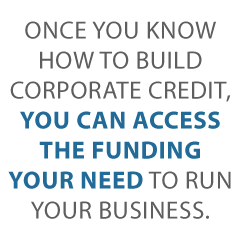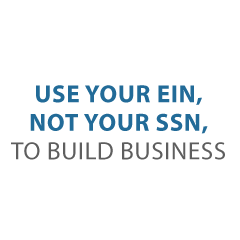
How to Build Corporate Credit and Run a Corporation
Business owners old and new often wonder how to build corporate credit. This is just one of the many questions that pop up when running a corporation. Thankfully, there is more information available than ever before on running a corporation, from building corporate credit to understanding your financial statements, and everything in between.
5 Tips for How to Build Corporate Credit and Make Your Corporation Fundable
Even if you are already up and running, you may be surprised at how some of these tips can help you. There is a lot going on out there that can affect your business. Most of it you may not even realize. There are several pieces to the puzzle. Often business owners cannot tell or see when one doesn’t fit simply because they can’t see the whole picture. Most often, they don’t even know there are parts of the puzzle they cannot see. If they do know it, they have no clue how to gain access, find the issues, and fix them.
Whether you are building your corporation in Delaware, which has long been a business building giant, Wyoming, which is fast catching up, or any other state, these tips can be useful.
How to Build Corporate Credit and Fundability Tip 1: Set Up Your Business for Success
Let’s go back to the puzzle example for a minute. When you are first starting a large, complicated jigsaw puzzle, you don’t set up just anywhere. You try to find somewhere that will ensure successful completion. Think about it. Would you just dump out the pieces on the floor and get to work?
This would for sure be the fastest way to get started, but it would not foster success. Pieces could get kicked around and lost under furniture. It would take forever to find where the pieces you have fit, and those walking by could unknowingly cause all kinds of trouble with one ill placed foot.
Seasoned puzzlers know that you set up on a table that is used only for the puzzle. You gently put the pieces on the table, and you take the time to turn each one over while separating the edges from the middle.
When building corporate credit, you have to set your business up to be fundable and successful, just like with a puzzle. If you don’t, you could end up having to do a lot of work over again.
Check out our best webinar with its trustworthy list of seven vendors to help you build business credit.
Steps to Setting Up a Fundable Business
Of course, if your business is already in operation and you find you are lacking in some of these areas, you may end up needing to do a little extra work to get things on the right track. Take stock now, and get busy making sure all of these things are in place.
A dedicated business address and phone number is necessary.
Using your personal address and phone number will not work. Make sure your business contact information is listed in the business 411-directories as well. This is important for more than just making sure customers and potential customers can get in touch with you, as you will see later.
Your business needs an EIN.
An EIN works like your personal SSN, but it is only for your business. Many business owners think that it’s fine to just use their SSN, especially in the beginning. However, once you start looking into how to build corporate credit and how to make your business fundable, you’ll see that you definitely need to get an EIN. You get an EIN for free, easily, at IRS.gov.
Incorporation is a must.
This is hard for some new business owners to swallow, and if you are reading this and there is only one thing on the list you need to work on, my guess is this is it. Here’s why. It is so easy and affordable to run as a sole proprietorship that a lot of business owners never give it a second thought.
If you are currently operating as a sole proprietor, be aware that you will lose the time in business you acquired while operating as a sole proprietor. In addition, any payment history, negative or positive, will be lost as well. You will have to start over building business credit at square one. This occurs because a corporation is a separate entity from the owner.
In addition to tax benefits, it also helps protect your personal assets in case of a bankruptcy, because your business is a separate entity on its own. When it comes to building business credit, that separation is a key piece of the puzzle. It ensures that business accounts report on your business credit and not you personal credit.
It is necessary to incorporate, but it doesn’t matter which form of incorporation you choose when it comes to building corporate credit. An LLC, S Corp, and C corporation all function the same way for this purpose. Make the decision based up how much liability protection you need and your budget, as they all offer different levels of protection at varying costs. You do have to choose one though.
A Note About Registered Agents when You Incorporate
When you incorporate, you will have to list a registered agent. It’s probably not a good idea to list yourself. It may seem easier, but there are several reasons this doesn’t really work well.
First, you have to list an agent for each state your business is registered in. If you register in more than one state, obviously you cannot be listed as the agent in each one. You can only live in one place at a time.
Next, a registered agent has to have a physical address. A P.O. box will not work. Additionally, you run the risk of letting something slip through the cracks. This is especially true if you are trying to coordinate with agents in several different states. There is a lot to keep up with. The better option is to hire a registered agent service. They can easily coordinate in different states, offer a physical address, and ensure you have all the information you need when you need it. It’s an extra cost, but absolutely worth it.
Open a business bank account.
This isn’t just an account that you call your business account but use for personal stuff too. Your business needs a dedicated, official business bank account. Not only will it offer the separation needed for when you dig into how to build corporate credit and make your business appear fundable, but there are other benefits as well. For example, there are some types of funding you cannot access without a business bank account, like a merchant cash advance.
In addition, many lenders and business credit cards want to see a business bank account. It will be helpful to already have business expenses separate when you do your taxes as well.
Don’t forget to get a D-U-N-S number.
This is huge when you want to build corporate credit. The D-U-N-S number is a number that Dun & Bradstreet issues to each company in its database. You cannot have business credit with D&B unless you have this number. Since they are the largest and most commonly used business credit reporting agency, you definitely need it. You can apply for free on their website.
Get a professional business website.
This has to be more than just something you throw together on a free hosting service. You need to have someone professionally design and launch your site, and pay for hosting. The goal is to make your business appear fundable to lenders, and if a lender does any research on your business and either cannot find a website, or finds a bad one, it will not look good.
How to Build Corporate Credit and Fundability Tip 2: Consistency Across All Channels
Many applications for business credit are denied for suspicion of fraud rather than for a poor credit score. How do you avoid this? Setting up your business properly is a great start. There is a little more to it however.
Lenders and credit reporting agencies have access to way more information than you realize. If something doesn’t match up, it is going to throw up red flags. Your business name, contact information, and phone number should be the same everywhere. That seems easy, but consider how much is really out there:
- licenses
- insurance
- 411-directories (Remember I told you it was about more than just people being able to find your contact information.)
- rent or mortgage contracts
- business website
- other public records
Take some time to check all of these things to ensure that everything lines up. Another thing that seems small but can actually cause trouble in the world of corporate credit and fundability is the business email address. You definitely need one, but it should be the same as the owner’s. It can’t be from a free service like Gmail or Yahoo. Pay for an email address that has the same URL as the business website.
How to Build Corporate Credit and Fundability Tip 3: Work in the Right Order
The biggest piece of this corporate credit building puzzle is working the right order. If you are an existing business, you probably already have some business debt. Chances are though, unless you have already followed these steps, it is in your personal name and thus affecting your personal credit and not your business credit.
When you start researching steps to building corporate credit, you’ll likely starting seeing terms like vendor credit tier, retail credit tier, fleet credit tier, and cash credit tier. These are terms that relate to what order you should work in when applying for credit in your business name. If you immediately begin by applying for standard business credit cards with no limitations, you will be repeatedly denied. This is similar to trying to put together the center of a jigsaw puzzle first, without a picture for a guide. You’ll never get it.
Every puzzler knows you work the corners first, then put the edges together and work from the edges in. When it comes to how to build corporate credit, you start at the bottom tier and work your way up.
The Vendor Credit Tier
This is the bottom tier. It helps you get the ball rolling. You see, corporate credit doesn’t build passively like consumer credit does. This means, unless you have actively worked at building it, you likely have no credit in the name of your business. It is almost impossible to get credit without credit, so what do you do? Then answer is the vendor credit tier.
This tier is made up of retailers that will extend net 30 terms on invoices without a credit check. The best part is, they will report your payments on these invoices to the business credit reporting agencies like D&B, Experian, or Equifax. This, in turn, begins to build your corporate credit score.
Check out our best webinar with its trustworthy list of seven vendors to help you build business credit.
The Other Tiers
Once you have 8 to 10 retailers from the vendor credit tier reporting, you can work in to the next tiers. After vendor credit comes the retail credit tier. This includes credit cards from retailers that only allow you to use the cards at their stores. For example, you can only use an Office Depot card at Office Depot, Office Max, or on those websites.
Get a few of those under your belt and you can apply for cards in the fleet credit tier. This tier includes cards from companies like Fuelman and Shell that only allow you to use them for automobile repair and maintenance costs and fuel.
Once you have several of these reporting you are ready for the final piece of this particular puzzle. That’s the cash credit tier. These include standard business credit cards that have lower rates, rewards, and no limits on where you can use them or what expenses you can use them for.
How to Build Corporate Credit and Fundability Tip 4: Make Responsible Decisions
If you complete all of these steps you will have strong corporate credit and a fundable business. However, it doesn’t stop there. Indeed, at every step along the way and into continuity thereafter you have to make responsible decisions in every area of your business.
This is of particular concern when it comes to how to build corporate credit. The reason is, you are racking up credit accounts left and right in an effort to build a strong business credit score. During this process, there is a huge potential for a couple of big blunders.
One trap that is easy to fall into is buying things that do not really benefit your business just to build the credit. It’s seems like and easy trap to avoid, but you can be in it before you know it. Of course, you have to use the credit for it to do what you need it to do, but do so wisely. Make a conscious effort to think about how each and every purchase will benefit your business and help it grow.
The other potential blunder is to dig the debt hole too deep. None of this will matter if you can’t make your payments consistently on-time. In fact, it will do more harm than good. Take some time to figure out how much you can afford in debt payments each month and spread that out over the accounts you are using for credit building.
Also, use business accounts only for things you would buy anyway. When you order from vendors in the vendor credit tier, order only things you are already using in the course of everyday business. Use the same rule of thumb for cards in the other tiers as well. There is no reason to accumulate unnecessary debt.
Pay Attention to Financials
There are a lot of business owners out there that do not understand what their financial statements are telling them about their business. If they pay any attention at all to them, they are simply relying on what their accountant or bookkeeper tells them.
It is essential for a business owner to understand their business financial statements. Without this understanding, it is almost impossible to make responsible decisions.
How to Build Corporate Credit and Fundability Tip 5: Monitor Your Credit
Credit monitoring is important both while you are building corporate credit and after you have a strong, established score. At each step of the credit building process you need to know which accounts are reporting. This is how you will know it is time to move on to the next tier.
Credit monitoring is also essential to maintaining that consistency that is needed for fundability. If you see a mistake on your credit report, you can have it corrected. If you notice old information, you can update it.
Check out our best webinar with its trustworthy list of seven vendors to help you build business credit.
How to Build Corporate Credit and Making Your Corporation Fundable Go Hand in Hand
It’s true. You can have corporate credit and not be fundable, but your business cannot be fundable without strong corporate credit. The best way to ensure your business is fundable is to start working to build strong corporate credit from the very beginning. Many of the steps to building fundability and building corporate credit are the same, and you need both to run a successful business.
The post How to Build Corporate Credit and Run a Corporation appeared first on Credit Suite.







